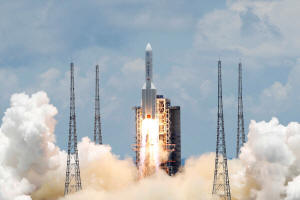Uncrewed Chinese spacecraft successfully enters Mars orbit
 Send a link to a friend
Send a link to a friend
 [February 11, 2021]
By Ryan Woo and Liangping Gao [February 11, 2021]
By Ryan Woo and Liangping Gao
BEIJING (Reuters) - An uncrewed Chinese
spacecraft on Wednesday successfully entered orbit around Mars after a
6-1/2-month journey from Earth, China's space agency said, in the
country's first independent mission to the red planet.
The robotic probe carried out a 15-minute burn of its thrusters at 7:52
p.m. Beijing time (1152 GMT), the China National Space Administration
said in a statement, slowing the spacecraft to a speed at which it could
be captured by the pull of Mars' gravity.
In May or June, the Tianwen-1 will attempt to land a capsule carrying a
240-kg rover in a rapid seven-minute descent onto a massive plain in the
northern hemisphere of Mars known as Utopia Planitia.
If the landing is successful, the solar-powered rover will explore the
Martian surface for 90 days, studying its soil and seeking signs of
ancient life, including any sub-surface water and ice using a
ground-penetrating radar.

Tianwen-1, or "Questions to Heaven", the name of a Chinese poem written
two millennia ago, is China's first independent mission to the planet
after a probe co-launched with Russia failed to leave the Earth's orbit
in 2011.
The probe is one of three reaching Mars this month. The Hope spacecraft
launched by the United Arab Emirates successfully entered the planet's
orbit on Tuesday. Hope will not make a landing but will orbit Mars
gathering data on its weather and atmosphere.
[to top of second column]
|

The Long March 5 Y-4 rocket, carrying an unmanned Mars probe of the
Tianwen-1 mission, takes off from Wenchang Space Launch Center in
Wenchang, Hainan Province, China July 23, 2020. REUTERS/Carlos
Garcia Rawlins/File Photo

Tianwen-1 will also have an orbiter component surveying the Martian
atmosphere with a range of instruments including a high-resolution
image camera.
The two probes join six other orbiting spacecraft above Mars
launched by the National Aeronautics and Space Administration
(NASA), the European Space Agency (ESA) and India.
In the United States' most ambitious Mars mission, the 1-tonne
Perseverance probe is expected to arrive on Feb. 18. It will
immediately attempt a landing in a rocky depression with precipitous
cliffs called Jezero Crater.
On the surface, Perseverance will gather rock samples for retrieval
by a future mission. Two other NASA rovers - Curiosity and InSight -
are currently operating on the planet's surface.
Perseverance will also attempt to deploy a small helicopter named
Ingenuity in the thin Martian atmosphere.
(Reporting by Liangping Gao and Ryan Woo; writing by Tom Daly;
editing by Jason Neely and Alexandra Hudson)
[© 2021 Thomson Reuters. All rights
reserved.] Copyright 2021 Reuters. All rights reserved. This material may not be published,
broadcast, rewritten or redistributed.
Thompson Reuters is solely responsible for this content. |